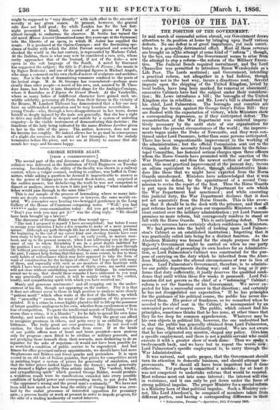GEORGE BIDDER AGAIN.
[FROM A CORRBSPONDENT.]
The second part of the oral discourse of George Bidder on mental cal-
ulation delivered at the Institution of Civil Engineers on Tuesday evening. Incidentally, the utility of the faculty was shown in a railway contest, where a vulgar counsel, seeking to confuse, was baffled in Com- mittee, while asking a question he deemed it impracticable to answer as to the power of bridge-piers to obstruct flood-water, and, surprised at the sudden answer' but disbelieving the truth he was not competent to dissect or analyze strove to turn it into jest by asking "what number of fishes would pass analyze, in the same time ? " This is one sample of the process of lawmaking where so many inte- rests are deeply concerned : engineers or lawyers, the same morale ex- isted. We remember once hearing two bewigged gentlemen in the Long Gallery of the House of Commons coinparing notes. " Well ! you had "41*** under cross-examination today : did you get an admission ?" "Don't you wish you may get it ? " was the slang reply. "He should have been brought up a lawyer."
. The discourse of George Bidder was thus wound up-
" The task I propoaed to myself I have accomplished; but before I cease le occupy your attention I have a few remarks to make of a more personal nature. Although my path through life has at times been rugged, yet from the beginning to the mei of my career kind and sterling friends have ever been ready to help me in times of need ;• in early youth, in mature man- hood, and up to the present moment, when I am addressing you in the pre- sence of .one to whcse friendship I am in a great degree indebted for the position I now enjoy. It has not been, however, my lot to pass through life without provoking some unfriendly feelings ; and on candidly reviewing the past, I cannot help feeling that this may, to some extent, be due to those early habits of self-reliance which may have appeared to take the form of want of consideration for the feelings of others : but I hope that with many of these, and especially with such as are members of this Institute with which I have been associated for upwards of thirty years, my useful career will not close without establishing more amicable feelings. In conclusion, permit me to say, that should these remarks I have addressed to you tend to any practically useful result, it will be mainly owing to the cordial, kindly, and sympathizing spirit with which you have received me."
Manly and generous sentiments ! and all cropping out in the under- current of his life, though not appearing on the surface. Pity it is that it does not oftener occur to those in high position to analyze more closely- " patient merit" which often waits at the foot of the ladder, up which the " unworthy " swarm, for want of the recognition of the generous- nikded. It is a crime in a man highly placed to fail to lift up the possessor of latent qualities analogous to his own, whether from carelessness or from fear of competition. To quote the intellectual morale of Talleyrand, "It is worse than a crime, it is a blunder" • for he fails to spread his own fame thereby, and marks out his own deficiencies. Only the great can afford to recognize greatness in others, and petty envy is an unfailing sign of littleness. The truly great are ever generous ; they do not need cold caution, for their instincts save them from error. If at the heads of our public offices men of heart and brain presided—men anxious only for progress—men fitted to be civilian or military generals, and not grudging those beneath them their rewards, men disdsmmg to do an injustice fur the sake of nepotism—it would not have been possible for so wretched a condition of public service to be engendered. And had fitness for office governed railway appointments, we should have had more Stephensons and Bidders and fewer quacks and pretenders. It is upon record in an old tale of Italian painters, that prizes for competitive merit in painting begat a system of prizes for generosity of emulation, and that the latter prizes ranked higher than theformer • moral generosity was deemed a higher quality than artistic talent. The "ardent, kindly, and sympathizing spirit" which greeted George Bidder, would produce a wondrous result were its ramifications extended into every possible condition of helpfil power and corresponding merit, to put down both "the oppressor's wrong and the proud man's contumely.' We have not been told how much or how long the utility of George Bidder was over- laid by the unfair processes of interested opposition for pecuniary gain ; a process busily at work at present in order to impede progress, for tfie sake of a trading mediocrity of vested interests.


































 Previous page
Previous page